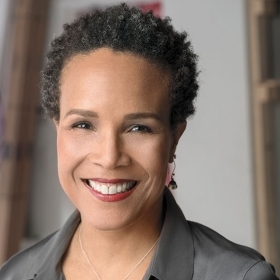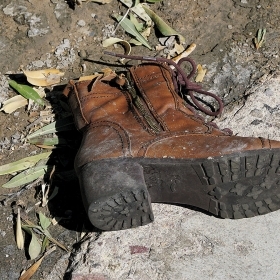The Calderwoods, as they’re known on campus, focus on writing for the “real world” rather than the academic one. The aim is for students (primarily seniors) to learn to translate complex arguments and professional jargon for a broad audience.
Lynne Viti and her Calderwood seminar students
Photo by Richard Howard
Stanford Calderwood likely would have reveled in senior lecturer Lynne Viti’s class WRIT 390: Law, Medicine, and Ethics. A dozen students gathered around a seminar table are peer-editing op-eds on topics ranging from the medical benefits of living in a multigenerational household to the ethics of research on brain cancer. They’re honing the language, punching up the leads, questioning sources, and encouraging clarity. The dialogue is straightforward and rigorous—not unlike an encounter between a reporter and an editor in a newsroom.
Calderwood, who died in 2002, started out as a newsman, working as a reporter-photographer in the Navy and then as a United Press correspondent before joining the Polaroid Corporation, where he rose to executive vice president. He later became president of WGBH-TV in Boston and eventually led the Trinity Investment Management Company. On and off from 1972 to 1985, he also taught a popular course, called The Corporation, in the economics department at Wellesley. His family foundation has supported Boston museums, theater, the Boston Athenaeum, the MacDowell Colony for writers and artists, and more, awarding more than $90 million in grants—including to Wellesley.
The Calderwood Seminars in Public Writing launched in the fall of 2013. Since then, the program, led by David Lindauer, Stanford Calderwood Professor of Economics, has introduced 19 seminars across disciplines. They range from The New York Review of Books at Fifty, a course taught by poet and English professor Dan Chiasson that focuses on the art of the book review, to Environmental Synthesis and Communication, taught by environmental-studies professor Jay Turner, in which stu-dents choose a “beat,” interview experts, and write everything from blog posts and tweets to press releases.
The Calderwoods, as they’re known on campus, focus on writing for the “real world” rather than the academic one. The aim is for students (primarily seniors) to learn to translate complex arguments and professional jargon for a broad audience—something that is necessary to success in life beyond college.
As Zoee Kanellias ’13 wrote to Lindauer about his Calderwood seminar, “Economic Journalism was the most valuable course I ever took, not just in terms of developing my writing, but also in terms of how I look at the world and digest the information around me. What I learned … contributed to my confidence and ability to take on new roles and opportunities professionally.”
Lindauer adds, “Zoee works for a small startup, and her boss said, ‘I want you to do some marketing with telecoms.’ She didn’t know anything about telecoms. But instead of freaking out, she said, ‘Oh, that’s kind of what we had to do in Econ 335.’ Because in essence, we tell the student, ‘Here, this is your assignment. We haven’t talked about any of this in class first. Just do it.’”
It’s that focus on a skill essential to the transition from school to work that has resonated on other campuses, Lindauer says. Beginning in the fall, the program is expanding beyond Wellesley: 32 courses modeled on the Calderwoods will be taught at five institutions—Amherst, Bard, Georgetown, Middlebury, and Wesleyan. “We’ve struck a chord,” says Lindauer.
Twelve Calderwood seminars will be offered at Wellesley this fall. “We’ve never had more than 10, and we’ve usually had eight or nine,” says Lindauer. “That’s a big increase. And look at the caliber of faculty being added to the program. One of our rookies next year is Cappy Lynch [Kathryn Lynch, Bates/Hart Professor of English]. She wins the prize for best title of a Calderwood seminar. She’s a Chaucer expert, and hers is entitled Dead Poetry Society.”
For more information, visit the Calderwood Seminars online here.


